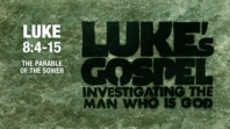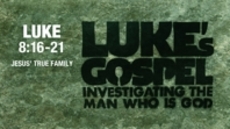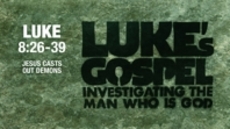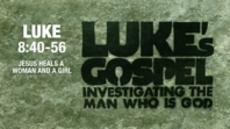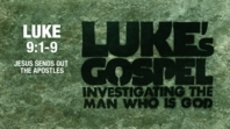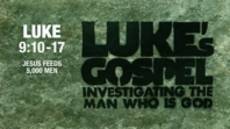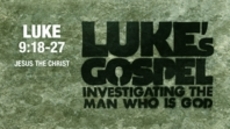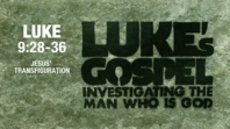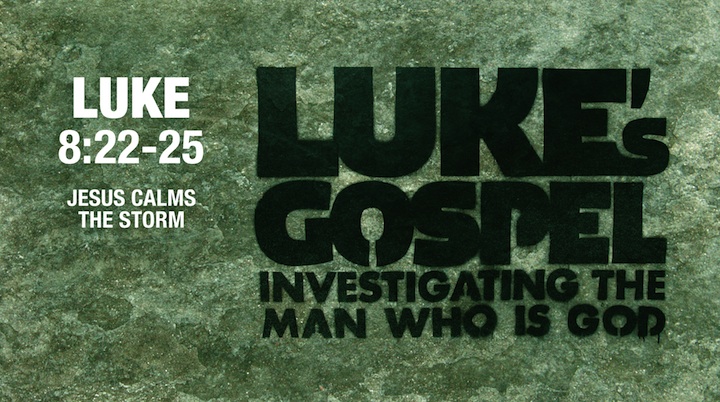
Can’t see the video? Download and install Flash to be able to view. Get Flash Here
Pastor Mark preaches on the shores of the Sea of Galilee, where Jesus—fully man and fully God—ministered to crowds of thousands. As a man, he was truly exhausted when he and his disciples set out in a boat to cross the sea. He was so tired that he slept through a dangerous storm that made his disciples—experienced fishermen—desperate for help. As God, he commanded the wind and waves to be still; they obeyed Jesus’ voice, the voice of the Creator. The disciples were amazed because only God has such authority. Jesus is the Creator who made the world and the Savior who came into the world to rescue sinners.
22 One day he got into a boat with his disciples, and he said to them, “Let us go across to the other side of the lake.” So they set out, 23 and as they sailed he fell asleep. And a windstorm came down on the lake, and they were filling with water and were in danger. 24 And they went and woke him, saying, “Master, Master, we are perishing!” And he awoke and rebuked the wind and the raging waves, and they ceased, and there was a calm. 25 He said to them, “Where is your faith?” And they were afraid, and they marveled, saying to one another, “Who then is this, that he commands even winds and water, and they obey him?”
The Holy Bible, English Standard Version copyright © 2001 by Crossway Bibles, a publishing ministry of Good News Publishers. Used by permission. All rights reserved. Quotation information.
Luke 8:22–25
22 One day he got into a boat with his disciples, and he said to them, “Let us go across to the other side of the lake.” So they set out, 23 and as they sailed he fell asleep. And a windstorm came down on the lake, and they were filling with water and were in danger. 24 And they went and woke him, saying, “Master, Master, we are perishing!” And he awoke and rebuked the wind and the raging waves, and they ceased, and there was a calm. 25 He said to them, “Where is your faith?” And they were afraid, and they marveled, saying to one another, “Who then is this, that he commands even winds and water, and they obey him?”
Howdy, Mars Hill. We are here on the shores of the Sea of Galilee. This was a region in which much of Jesus’ early ministry occurred. Luke is one of the most chronological, perhaps the most chronological, gospels telling the story of Jesus in historical order. And he actually reveals to us that the first portion of Jesus’ ministry was in and around Galilee and the region of Galilee. The book of Luke actually breaks down at 9:51 where it says that, “He set his face toward Jerusalem.” That’s the geographic breakdown of the book of Luke. And so up until that point, the first portion of Jesus’ ministry would have been in the region of Galilee, and then he began his journey toward Jerusalem, ultimately his crucifixion, and the book then transitions at 9:51 into Jesus’ journey and ultimate death, burial, resurrection in Jerusalem.
What’s interesting, as well, is that most of Jesus’ disciples came from this particular region of Galilee. If I’m not mistaken, perhaps all but Judas Iscariot came from this general region. Not surprisingly, it was filled with small towns that were essentially villages for fishing and for farming. Peter lived not far from here, as well as Andrew, James, John, Matthew. Others either lived or resided at certain points in the ministry of Jesus in this region and area of Galilee. The towns and villages surrounding us were actually quite small, fifty to a hundred people as we’ve seen some of the archaeological digs and investigations. So you’re looking at ten, twelve, fifteen families, perhaps, constituting a city or a village.
We know, as well, that nineteen of Jesus’ thirty-two parables were spoken and taught in the region of Galilee, and as we look around at the panoramic scenery, it’s not surprising that he used a lot of imagery from fishing and farming. That would have absolutely been consistent with the landscape here and upwards behind us over the hill.
What’s interesting, as well, is some of the details about the Sea of Galilee. I don’t know about you, when I first heard of the Sea of Galilee in the Scriptures, I did not imagine anything of this scope or magnitude. You’re looking at twelve miles across the lake, six miles across the lake, two hundred feet deep at its greatest depth. And we are told from the locals that the lake actually was much larger. The shore would have extended up some additional forty yards even last year. And in the days of Jesus, if you can see into the distance, there would have been beaches and shores up the hillside, and with this being a primary source of water, it has been depleted over the years, so as magnificent and large as the Sea of Galilee is, remember that in the days of Jesus, it was actually much larger.
As you read the Scriptures, you’ll hear this referred to in a variety of ways. In the Old Testament, you’ll hear it called Kinneret. In the New Testament, it will be referred to as the Sea of Tiberias, the Sea of Gennesaret, or the Sea of Chinnereth. Part of that is because the lake is so large that there are multiple villages and towns that existed in the days of Jesus, surrounding the lake, and so the locals would name it after themselves. So over in Tiberias, you would call it the Sea of Tiberias. Likewise, if you were in Chinnereth, you would call it the Sea of Chinnereth, so it would be named by the locals contingent upon their village, and they sort of titled the lake after their locale.
Now, one thing that is interesting, as well, before we launch into Luke 8, is that though it is calm at present, for those of us who have been out on the lake in the evening time, as we did last night, the wind really does pick up, and it still does to this day. Between 3:00 and 4:00 and maybe 6:00 and 7:00 p.m., the winds really pick up and it can become quite treacherous on the lake. And so the locals and the fishermen know to be very careful during those hours, because if you get trapped in the middle of this lake during the moments of high seas and high winds, your life is in very severe jeopardy, and that leads us to Luke 8.
I will read it to you, and we will then pray. Luke 8:22, “One day he,” that is Jesus, “got into a boat with his disciples, and he said to them, ‘Let us go across to the other side of the lake.’” Isn’t it amazing, you read that, and you think thirteen men in a boat, perhaps six oars, and they’re gonna go for a nice row. Well, this is the nice row. This is quite an event. For Jesus to request this, it’s a big commitment on behalf of his disciples, who were weary and exhausted after a long day of ministry, to jump in the boat, to grab the oars, and to make this journey.
“So they set out, and as they sailed he fell asleep. And a windstorm came down on the lake, and they were filling with water and were in danger. And they went and woke him, saying, ‘Master, Master, we are perishing!’ And he awoke and rebuked the wind and the raging waves, and they ceased, and there was calm. He said to them, ‘Where is your faith?’ And they were afraid, and they marveled, saying to one another, ‘Who then is this, that he commands even winds and water, and they obey him?’”
Father God, I do thank you that we have an opportunity to be on the shores of the Sea of Galilee on this, a Sunday, the resurrection day of Jesus Christ. And God, we thank you for the opportunity to open the Scriptures, and see the place where the events that are recorded faithfully and perfectly transpired. It is our request, Lord God, as we open the Word of God, that we would not be focused primarily on the lake or the storm, but on the one who calmed them. May we learn about Jesus. May we learn about his humanity in his exhaustion, and his divinity in commanding the wind and the waves to obey him. And so God, as we open your Word, we ask that the Holy Spirit, who has inspired the Scriptures to be written, would come to illuminate our understanding of them, so that we might learn to love, appreciate, worship, and serve, and enjoy Jesus, in whose name we pray, Amen.
Now, what is interesting is that, preceding what we just read in Luke 8, Jesus had been doing a lot of preaching, teaching, healing. We are told, in the section of Luke 8 that precedes the portion we just read, that large crowds and multitudes were coming to hear Jesus. And let me just say that this would have been very unusual. The town he grew up in, Nazareth, was fifty, perhaps a hundred people. Our guide was gracious enough to inform us that most, if not all, of the women who lived there would have been illiterate, that the men generally were illiterate, that perhaps only a handful of men, five or so, would have been literate. And so for Jesus to be literate growing up in a small town as a carpenter’s son would have been unusual. For him to be such a learned man and a good teacher, that they were amazed at his insights earlier in Luke as he went to the temple and dialogued with the scholars of the Old Testament Scriptures. And that he would have been qualified, competent enough to be called a rabbi. That’s very unusual for a man from such a humble beginning. And Jesus was a rabbi, meaning he was a preacher and a teacher.
And large crowds would come to him, and we read that, and we think, “Well, of course, Jesus drew large crowds.” Well, that’s because most of us live in cities in or near major urban centers. Again, think about spread villages, fifty to a hundred people scattered around the lake. For Jesus to amass audiences of thousands was an extraordinary event. And for them to walk in the heat, for them to come to places, and hear him preach and teach was very, very unusual.
Well, we are told that the result was Jesus was exhausted. That’s what Luke tells us in chapter 8 beginning in verse 22, that he was tired, that he was weary. And I am exhausted and I am weary driving around in a bus to see where Jesus walked. I don’t know about you. I couldn’t imagine walking. I mean, you hear that Jesus went from this town to this town, and then you realize that that’s a few days’ walk. And you read that Jesus wanted to be alone, and there was a multitude, so he climbed up a hill. And then you look at Mount Hermon that’s six thousand feet at its peak, and you realize, he really wanted some silence and solitude. And the reason that he was left alone is no one else was willing or able to make that kind of journey. Jesus was in extraordinary shape, unbelievable shape.
It has been upwards of 100 degrees with almost 100 percent humidity in our time here. If you can imagine thousands following him everywhere he went, no hotel to go to, no bus to climb on board, difficulty, perhaps, finding shade, and water, and food. He doesn’t have a guide. People are following him, and he’s having to lead them. Some are hurt, some are tired. Others need prayer. A few have demons that need to be cast out. He’s been preaching, teaching, answering questions. He’s been doing this for a lengthy season. He is absolutely exhausted. Again, I’m tired. I’m exhausted this morning, to be honest with you. And I woke up, and I prayed, I said, “Lord, how will I do it?” And then I remembered I have to preach on Jesus’ ministry being extraordinarily more difficult than anything we’ve endured, and that does help us to appreciate what we read in Luke 8, that the crowds were coming to him. They were pressing in upon him.
And I’ll tell you this, Jesus was fully God, fully man. And what can happen is sometimes we see Jesus almost as if he’s Superman, that outwardly he looks like a humble Galilean peasant, a carpenter, and a rabbi, but under his cloak, he would have worn a red “S” on his chest for savior, and that he was indestructible. And the result is that sometimes we don’t fully appreciate the humanity of Jesus. Philippians 2:5–11 says that he came humbly, that he set aside the continual use of his divine attributes, that God became a man to reconcile men and women to God, and he did so humbly as our priest, as our intercessor, as our advocate. That’s why Hebrews says that we do not have a high priest who is unable to sympathize with us in our weakness, but he has been through what we have been through. He understands what we are enduring.
And so he was absolutely fatigued, exhausted. And I can tell you, as a pastor with a ministry that is far less demanding than Jesus’, it does get exhausting. There is a limit to the number of hours you can work. There is a limit to how far you can press yourself. There is a limit to, even though you love people, how many you can serve continually. I’m here right now, to be honest with you, with an ulcer that I’ve been enjoying for about a month or so, just from overwork, and pressure, and requirements of ministry. And that’s with all of the advent of modern technology, that’s with the support of a wife, and a family, and a staff. I can’t even imagine the pressure of the ministry of Jesus.
There was no one that drew the crowds that he did. A typical rabbi would have a synagogue in one of these small towns that would attract upwards of twenty people for the Scripture reading on the Sabbath. And Jesus has thousands that follow him wherever he goes. I want you to get the magnitude of the exhaustion of Jesus.
So what does he tell his disciples? “Pull up a boat.” And Peter and others were fisherman, they had fished on this lake. They had spent much of their upbringing here. This is where they fed their families, and where they enjoyed their trade, as it were. And he realized the only way to get away from people was to go out there, was to go out there. They couldn’t follow him, and if they did follow him, it would only be for a while. And so he asked his disciples to get him a boat, and to take him to the other side, perhaps knowing that the crowds would meet him there eventually, but he might actually get a day off.
Jesus is so exhausted, we are told, that he goes underneath, or into the boat. And we can assume, we saw yesterday, the excavation of a roughly two-thousand-year-old fishing boat. It gives you some idea of what Jesus and the disciples were on. Thirteen men on a boat of that size, it would have been a full boat under a heavy load. And we saw on that boat there was a potential place, if Jesus’ boat was the same or similar, for him to tuck away to get some sleep. Now, how tired is Jesus when that looks like a nice hotel? When that looks like a good place to sleep? He’s that exhausted.
He lays down to sleep, and the disciples faithfully—the fishermen who are well schooled in how to cross this lake, they begin rowing, perhaps six of them, and then the men are, perhaps, taking shifts, six at a time, and they begin rowing, and what do we read? Well, we read, “A windstorm came down on the lake, and they were filling with water and were in danger.” These are men who knew the seas well. These are fisherman, these are not novices, and they realize this storm is potentially catastrophic. Some of the other gospels will record that they had been rowing all night.
Now, you have to understand that the disciples are exhausted as well. They’ve been preaching, and teaching, and feeding, and tending to, looking after thousands, taking care of the elderly, tending to the children. People are dehydrated, they’re hot, they’re hungry, some are grumpy, some, perhaps, fell, rolled their ankle, got injured. There are pregnant women to tend to. There’s conflict to mediate. The disciples are equally exhausted.
And they’re rowing all night, and if you can imagine being out on this sea in the middle of the night, it is just utter and complete darkness in the days of Jesus. And so if, in fact, it was night, they had very difficult capacity of even seeing a fire over on the shore. At some point you just get exhausted and bewildered. You’re just rowing, and you’re disoriented. And they know, “We are not making progress. This storm is so strong, we have been turned around so many times that we don’t know if we’ll be able to survive, and find our place to shore.” And so in a moment of desperation, the fishermen come to the end of themselves. And my guess is they don’t want to awaken Jesus. They love him. They know he’s exhausted, and if anyone needs this rest, it is that man.
And they awaken Jesus, “Master, master, we hate to awaken you. There’s nothing else we can do, humanly speaking.” The fishermen are going to drown on the lake that they have spent their life navigating storms. And so what does Jesus do? “He awoke, he rebuked the wind and the raging waves, and they ceased, and there was a calm.” There’s no indication that this was a long process, that this took a lot of time, or that for Jesus, this was even very complicated. “Jesus, we hate to awaken you. We’re all going to die.” Jesus stands up, “Stop,” and perhaps lays back down, and goes back to sleep. And the wind dies. And again, if you’re here during the winds, these are strong winds that go for multiple hours, and at times, can kick up unexpectedly. Not only did the winds obey him, but the waves obey him. He just looks at the sea, calm, and it’s tranquil as we enjoy it this morning.
Now, Luke, who is writing this, is a medical doctor. He’s an educated man. He was a traveling companion of Paul. He opens Luke by telling us that he is basing his biography of Jesus on eyewitness testimony, that he was financed by excellent Theophilus, perhaps a governor or leader with that title “excellent.” And this was his benefactor, so we can assume that Theophilus, this affluent man, helped to finance Luke’s research. Luke, being a medical doctor, also would have invested his life savings, and taken multiple years to travel throughout this region to interview those who were involved. And so this is based upon the eyewitness testimony of some of the men who were there. Luke actually interviewed them. He talked to Peter and others and he would have asked them exactly what happened. He confirmed that all of their stories corroborated, and that this is, in fact, what happened, and is historically accurate.
He said to them, “Where is your faith?” Why? They were amazed. They were absolutely stunned. They knew Jesus was a miracle worker, and a demon caster, and a great teacher, but this is the revelation of their friend Jesus as God incarnate, as the second member of the Trinity, the Son of God coming into human history.
“And they were afraid, and they marveled, saying to one another, ‘Who then is this, that he commands even winds and water, and they obey him?’” The disciples are bewildered. “Who is this Jesus? We thought he was a holy man, a rabbi, perhaps a prophet. Like many do today, he’s a good man, and a moral teacher, and a wonderful example, and maybe had a bit of supernatural capacity, but this far exceeds anything we had previously ascertained about this man, Jesus. Who is he?”
That’s a great question. It’s a great question, and it reveals the divinity of Jesus. It reveals the divinity of Jesus. And here we see the divinity and humanity of Jesus coming together. The humanity: he is fully man. He is completely exhausted. He’s fully God, and the wind and the waves obey him.
Now, what has happened in the history of Christianity is that some have stressed the humanity of Jesus, they tend to be more liberal. Others stress the divinity of Jesus, they tend to be more fundamental. And the Bible says that Jesus was fully man, fully God. One person, two natures. We’re not teaching that a man became God. We’re teaching that God became a man. In 451, the Christians got together for the Council of Chalcedon, and they termed this “the hypostatic union.” Jesus is one person with two natures: fully man, fully God. And we see this here as he is preaching, and teaching, and working, and feeding, and healing, and casting out demons, he does so out of his humanity as a man, fully exhausted, desperate for a break, needing reprieve from the crowds, asleep in a boat, so tired that he sleeps through a horrendous storm.
And then we see him reveal his divinity in two ways, number one: it reveals to us that Jesus is Creator. We are told throughout Scripture that Jesus is Creator. We read in Genesis 1 that everything that came into existence and all of creation was by virtue of the Word of God, that God proverbially spoke creation into existence. God said and it was so. God said and it was so. God said and it was so. That’s the rhythm of Genesis 1. We then read in places like John 1:3 of Jesus, “All things are made through him.” And Colossians 1:16, “By him all things were created.” And so God spoke creation into existence, and Jesus is that God who spoke creation into existence. This explains why the wind and the waves obeyed his voice. This is the voice they had heard previously at creation. It was the Word of God.
It was the declaration of God in Genesis 1 that caused all that is to come into existence out of nothing, what the theologians would call “ex nihilo.” It says it this way in Hebrews 11, “Out of nothing, everything was made.” God didn’t start with matter, God started with himself existing eternally, and he created time, space, and matter. He spoke the world, and the wind, and the waves into existence. And his name is Jesus Christ. And so when he then enters into his creation, adds to his divinity, humanity, to quote the church father Augustine, he stands up and speaks, and creation obeys him, because he is the author of creation. The same one who spoke this world into existence just gave it a command to obey him. And does it? Absolutely.
And the disciples, in seeing this, they recognize, “This is God. This is God among us.” Only God has authority to command the wind and the waves. And these were men who were learned in Scripture, and they would have taken note of many Scriptures. Due to the heat and the time, I won’t read them all, but the Psalms speak frequently of God’s voice being the only one that can still the waves and the waters. Psalm 65:7, Psalm 89:9, Psalm 106:7–9, and Psalm 107:23–29. I’ll read one for you as well, Psalm 89:9. “You,” speaking of God, “Rule the raging of the sea; when its waves rise, you still them.” I’ll read it again. “You rule the raging of the sea; when its waves rise, you still them.”
These men were familiar with the Psalms, this and others, where it says that the wind and the waves were under the jurisdiction of the God who created the heavens and the earth. And this Jesus who has come is Creator God, and sovereign, ruling, reigning God, to the degree that the wind and the waves obey him. That being said, we’re here to worship Jesus, to acknowledge that our creator is also our redeemer, and our sustainer. He’s our savior. His name is Jesus, and that our life is much like that occasion recorded in Luke 8.
We are living our life, we are exhausted, we are weary. Crisis comes out of nowhere, and it is good for us to always do as they did, and go find the Master, to go to Jesus in prayer, to go to Jesus in Scripture, to go to Jesus in song, to go to Jesus requesting help. And they did the absolutely only thing that they could do, and what is interesting is that they didn’t go to Jesus until they had exhausted all of their own efforts. And so many of us live so much of our lives in that same trap. Out of nowhere, comes a great storm. We work ourselves until the point of being at the end, and then in desperation, we call out to Jesus. He comes to help, to serve, to be with us. And friends, I would just encourage you, it’s not something I’ve practiced well, but we should go to Jesus first, and we should ask the one who created the world, and rules the world to help us as his servants in it.
So Father God, we thank you for the Scriptures. We thank you for the Lord Jesus. We thank you that he is Creator, he made the world. We thank you that he is Savior, he came into the world to live without sin, to die for sinners, to rise for salvation. We thank you, Lord Jesus, that you are sovereign, and ruling and reigning over creation today. And we thank you that whatever storm we find ourselves in, no matter how hard we have rowed against it, that if we simply come to you, you do love us, you will navigate for us, you will get us through it, that you are deliverer and savior. We love you, we worship you, we thank you, and we thank you, Lord God, that we get an opportunity to understand a little bit more of Jesus as we enjoy the Scriptures here on the shores of the Sea of Galilee. We’re grateful for this gift. In Jesus’ good name, Amen.
[End of Audio]
Note: This sermon transcript has been edited for readability.
